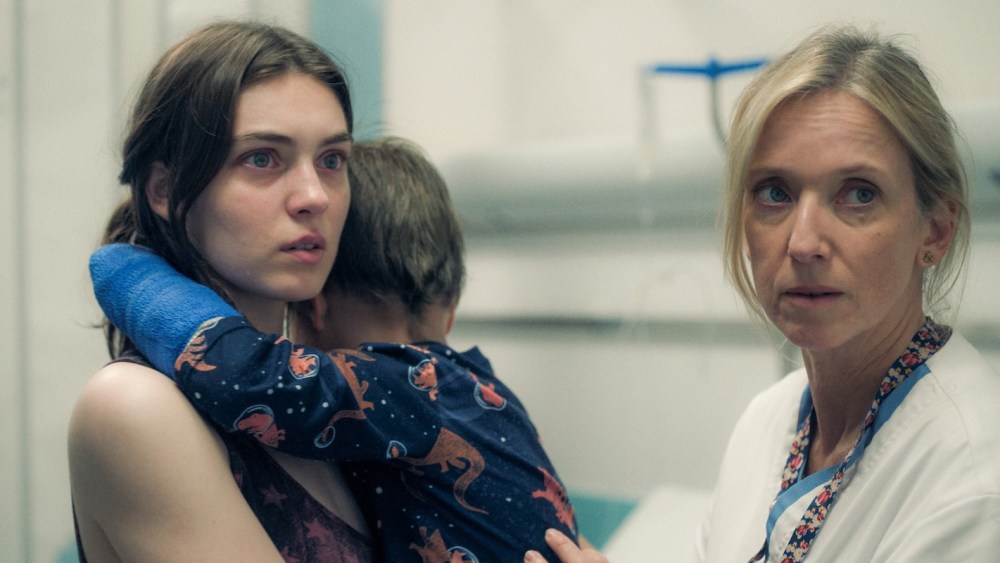Could Laura Wandel Be Heir to Dardenne Brothers?
Who decides what’s best for a child? In “Adam’s Sake,” a scrawny 4-year-old boy is admitted to the pediatric ward with a broken arm, which the doctors attribute to malnutrition. A social worker is called, and Adam’s mother — who’s hardly more than a child herself — is forbidden access to her son while hospital staff try to nurse him back to health. But Adam refuses to eat unless his mother is present, fighting against the feeding tubes the doctors have ordered.
All that is backstory that we piece together on the trot during the opening minutes of Belgian director Laura Wandel’s emotionally wrenching whirlwind, which is bolstered by a pair of terrific performances from Léa Drucker as Lucy, the pediatric department’s head nurse, and “Happening” star Anamaria Vartolomei as Adam’s mom, Rebecca — to say nothing of soulful newcomer Jules Delsart, the remarkable young actor who plays Adam.
From the get-go, we see Lucy attempting to mediate between the impatient doctor (Laurent Capelluto), an inflexible social worker (Claire Bodson) and desperate Rebecca, who’s been granted a narrow window of visitation on a probationary basis. The boy in turn clings to his mom’s neck, plaintively asking any who will listen whether she might be permitted to stay the night.
Over the course of a tight, intense 70-odd minutes, Wandel plunges audiences into the frantic hustle of this overtaxed hospital, observing through fresh eyes a world we know from countless TV dramas — much as she did the daunting turf of an elementary schoolyard in her stunning 2021 debut, “Playground.” In that film, Wandel developed a formal approach perfectly suited to her milieu, adopting the perspective of her 7-year-old protagonist as the first grader tried to make sense of her intimidating new surroundings. Adults, when seen, were either cropped at the waist (à la the teacher in “Peanuts” cartoons) or obliged to bend down into frame, engaging with the girl at eye level.
Wandel could have repeated that same tactic in “Adam’s Sake,” but instead of portraying the action from the poor kid’s point of view, she aligns herself with Lucy, employing a similarly dynamic observational style to that of her producer-mentor Luc Dardenne. Nimbly covering the action via a small handheld camera, cinematographer Frédéric Noirhomme shadows Lucy and the other characters via long unbroken takes, occasionally staring at the back of her protagonist’s head (as Dardenne often did in “Rosetta”).
It’s an audacious strategy — the way “Birdman” and “The Studio” deploy it, at least — though Wandel intends it not so much to impress as to immerse, and one that distinguishes “Adam’s Sake” from countless hospital-set procedurals. Wandel wants her audience to weigh the philosophical aspects of the situation, revealing the behind-the-scenes power struggles and split-second decisions that complicate Lucy and her superiors’ ability to spare Adam.
The stakes are enormous, as the medical staff makes clear, referring to Adam’s situation as if his life depended on it. Meanwhile, Rebecca works at cross-purposes, smuggling in plastic containers of a runny porridge-like goop she insists on feeding Adam instead of the hospital food. Without proper sustenance, the boy risks additional fractures, which makes it especially difficult to watch the scene in which Rebecca throws out the prescribed meal while Lucy’s back is turned.
Parents in particular may have a tough time dealing with Rebecca’s self-defeating behavior, which springs from a place of panic. Abandoned by Adam’s father, she has raised the boy this far on her own, but her instincts are off. While it’s not clear whether what’s she’s feeding him is vegan or some kind of religiously sanctioned alternative, Wandel has explicitly said that’s beside the point. Her focus is on the various hierarchies at play in this hospital, where parents typically have authority — and which this mom has somehow lost to the legal system.
Rebecca has cultivated a codependent dynamic with Adam whereby neither can stand to be apart from the other; she goes so far as to lock herself in the hospital bathroom with her son one moment, then all but kidnaps him the next. No wonder practically everyone on staff seems determined to restrain Rebecca and limit access to her son. Only Lucy seems to recognize that they need the mother’s cooperation in order for Adam to pull through, and her heroism goes all but unrecognized as she bends the rules for his benefit.
Lucy may have Adam’s best interests in mind, but she finds herself at the bottom of a chain of command, in which Adam’s doctor, the ward supervisor (Alex Descas) and eventually the law stand in her way. The movie can feel a bit melodramatic at times, especially when Adam finally speaks his truth — a chilling line it’s hard to believe any child actually saying — and yet Wandel respects both the audience and her characters enough not to pass judgment. In the end, “Adam’s Sake” is not quite as effective a film as “Playground,” but it most certainly confirms Wandel as a filmmaker to be reckoned with.


